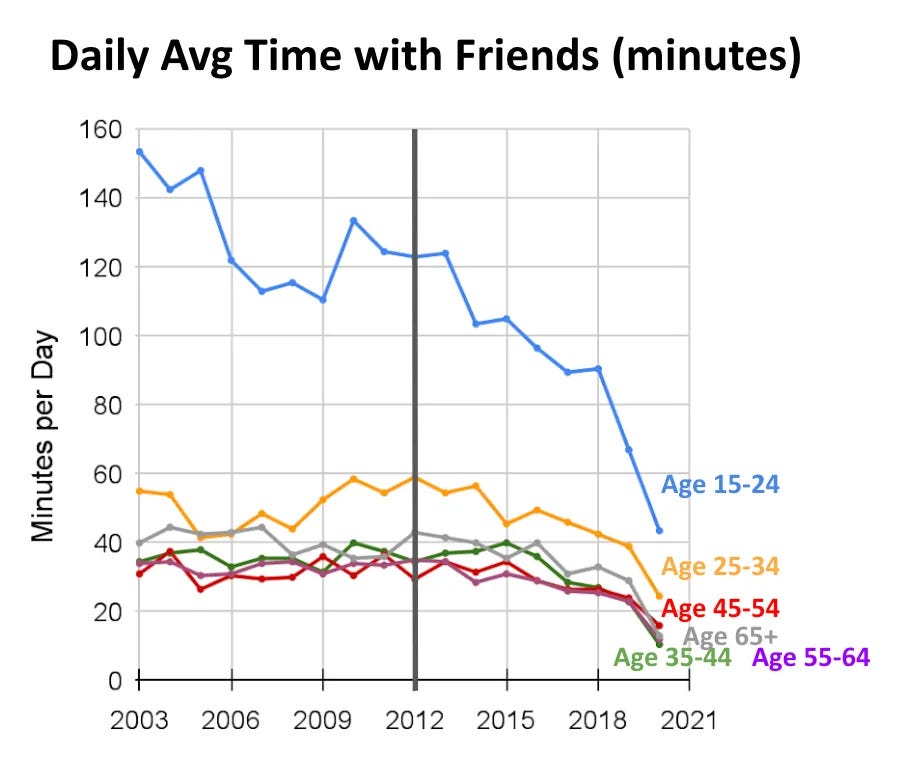When Experience is the Only Teacher
"Experience blockers," lessons from CBT, and the vital path to emotional and social development. This path is vital to both adults and children.
Hello Bar-Setters,
Today I have a compilation of amazing quotes which center around one central theme:
In many, if not most, circumstances, we learn far better from action and experience than from seeking information.
This is especially important for parents and educators to consider given that:
Technology often reduces and inhibits childhood experiences.
Anxiety disorders have proliferated over the past fifteen years among adolescents and young adults. The best treatment for anxiety disorders is exposure, meaning experience in the situations that make you anxious.
I’ll let the quotes take it from here:
The Threat of Experience Blockers
Even if the content on these sites could somehow be filtered effectively to remove obviously harmful material, the addictive design of these platforms reduces the time available for face-to-face play in the real world. The reduction is so severe that we might refer to smartphones and tablets in the hands of children as experience blockers….
It’s as if we gave our infants iPads loaded with movies about walking, but the movies were so engrossing that kids never put in the time or effort to practice walking.
Source: The Anxious Generation, pg. 54
…when a smartphone, tablet, or video game console lands in a child’s life, it will push out most other activities…
The child will spend many hours each day sitting enthralled and motionless (except for one finger) while ignoring everything beyond the screen…
If we want children to have a healthy pathway through puberty, we must first take them off experience blockers so that they can accumulate the wide range of experiences they need, including the real-world stressors their antifragile minds require to wire up properly.
Source: The Anxious Generation, pg. 99
Since we began giving most adolescents a smartphone, there has been a drastic reduction in authentic friendship and face-to-face interaction.

That is especially concerning when you consider the activities that are most important for young people’s development.
The Key to Emotional Development
…adult-led lessons may provide useful information, but information doesn’t do much to shape a developing brain. Play does. This relates to a key CBT insight: Experience, not information, is the key to emotional development. It is in unsupervised, child-led play where children best learn to tolerate bruises, handle their emotions, read other children’s emotions, take turns, resolve conflicts, and play fair. Children are intrinsically motivated to acquire these skills because they want to be included in the playgroup and keep the fun going.
Source: The Anxious Generation, pg. 53
The Most Important Lesson for Social Success
Let’s take a second to note a couple key ideas:
Socially awkward or insecure people can learn social skills. Those who are terrified of public speaking or of asking someone out on a date can become charismatic speakers and daters. The brain is malleable. Fears are surmountable. We can change and grow.
Such social skills are not best learned through books. They are learned through experience.
Such experience aren’t comfortable, but they are what we need!
Journalist Dan Coyle expounds on these tenets of CBT in his fantastic book, The Talent Code:
We believe that people are shy not because they lack social skills but because they haven't practiced them sufficiently," said therapist Nicole Shiloff. "Talking on the phone or asking someone on a date is a learnable skill, exactly like a tennis forehand. The key is that people have to linger in that uncomfortable area, learn to tolerate the anxiety. If you practice, you can get to the level you want." The godfather of this kind of therapy is Dr. Albert Ellis. Ellis, who was born in 1913 and raised in the Bronx, was a painfully shy teenager, unable to bring himself to speak to women. But one afternoon he decided to make a change. He sat on a bench near the New York Botanical Garden and chatted with every woman who sat down. In one month he spoke with 130 women. "Thirty walked away immediately," he said. "I talked with the other
hundred, for the first time in my life, no matter how anxious I was. Nobody vomited and ran away. Nobody called the cops."
Ellis, who went on to write dozens of books, built a straight-talk, action-oriented approach that challenged the Freudian model of examining childhood experience. "Neurosis is just a high-class word for whining," he said. "The trouble with most therapy is that it helps you to feel better. But you don't get better: You have to back it up with action, action, action."
Ellis's approach, combined with that of Dr. Aaron Beck, became known as cognitive-behavioral therapy, which has been shown, according to The New York Times, to be equal to or better than prescription drugs for combating depression, anxiety, and obsessive-compulsive disorder.
Source: The Talent Code, pg. 212
If you are digging this vein, check out this fantastic article which “highlights the importance of an outward action approach to mental health, emphasizing the need to engage in actions that promote individual and social well-being rather than fixating on introspection.”
Thank you for reading and sharing!
Carry the fire!
Shane





